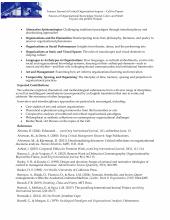From the beginning of sociological reasoning about organizations, the loss of identity of individuals in the iron cage of an organization has been a prominent image. From the grandfathers of sociology through contemporary researchers, the identity of the person and the identity of the organization have been seen as antipodes that put the identity of the individual at risk. In this paper, we used systems theory to reconsider the relationship between identity and organization. We argued that both the individual and the organization must balance various expectations that occur in real time. Using empirical data, we demonstrated how multi-identities are constructed, referring to specific societal presents and their restrictions. We argued that conflicting identity constructions of individuals in organizations must not be interpreted as symptoms of alienation or oppression. For example, talking about conflicting requirements of organizational practice may affirm the professionalism of an employee. Moreover, the display of different identity constructions of organizations (e.g., in reports and resolutions) does not point to programmatic inconsistencies or indecisiveness, but to the organization’s need to deal with the expectations of a modern society that does not allow its organizations to follow only one purpose.





